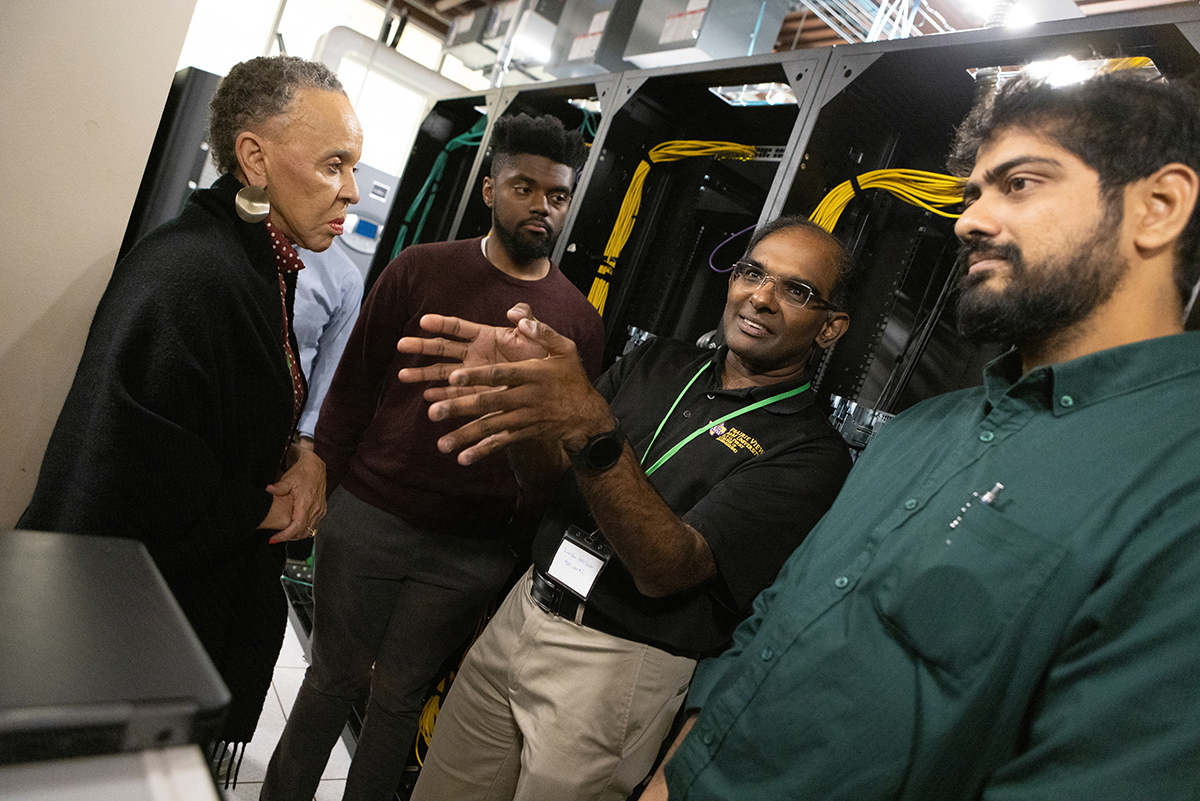Binghamton, HBCUs align for ’true collaboration’
newERA to focus on faculty-research initiatives

A summit held this spring at Binghamton University has led to a groundbreaking partnership with six historically Black colleges and universities.
Supported by Executive Vice President for Academic Affairs and Provost Donald Hall and Thurgood Marshall College Fund founder N. Joyce Payne, the New Educational and Research Alliance (newERA) will foster closer ties with Alabama A&M University, Central State University, Tuskegee University, Prairie-View A&M University, the University of the District of Columbia and Virginia State University.
Plans for newERA emerged from the Emerging Technology and Broadening Participation Summit organized by Binghamton’s Thomas J. Watson College of Engineering and Applied Science and led by Dean and SUNY Distinguished Professor Krishnaswami “Hari” Srihari. More than a dozen faculty members and students from the HBCUs toured the college’s laboratories and met in research affinity groups with Watson faculty to discuss holistic, equitable and sustainable collaborations built on the shared missions of education, research and service.
“After a full year of brainstorming and planning with Dr. Payne and the Thurgood Marshall College Fund, I am very happy to see this come to fruition. It is a groundbreaking alliance,” Hall says. “In the SUNY system, we’ve never had an outreach effort like this, so Binghamton is leading the way. We are approaching this in the sense of true collaboration — we’re equal partners in this, each bringing our own strengths and our own weaknesses, our own needs and our own aspirations. I think that bodes well for the future.”
By pooling resources, knowledge and expertise, the universities will embark on joint initiatives that tackle pressing societal challenges. The focus areas of research will include artificial intelligence (AI), data science, cybersecurity, materials, biomedical engineering, smart energy, future manufacturing, healthcare and agriculture.
“Binghamton has a reputation of being a great research university, and some of our HBCUs are on the verge of becoming great in some areas,” Payne says. “This was a prime opportunity to bring the two communities together to start the conversation.”
One key objective is to support faculty research collaborations. By providing access to shared lab resources, state-of-the-art equipment and advanced facilities, the universities will empower researchers to conduct cutting-edge investigations, foster an environment of knowledge-sharing and strengthen the research infrastructures of the participating HBCUs.
In addition to research-focused initiatives, the partnership hopes to nurture a diverse talent pipeline of graduate students interested in pursuing careers in engineering and computer science. By offering mentorship, joint course development and summer internships, the alliance will provide opportunities for students from underrepresented backgrounds.
“Our role in higher education is to transform the lives of our students — but also to think about ways that we can contribute to the success of our colleagues and students,” says Binghamton University Vice President for Diversity, Equity and Inclusion Karen A. Jones. “We’re building a concrete action plan so we’re not going to just check a box and say that we’re done. This alliance is going to have a life of its own, and it’s going to run.”
This summer, newERA took its first steps. Srihari traveled to Tuskegee University in July, while Nobel Laureate and Distinguished Professor M. Stanley Whittingham traveled to Alabama A&M in September for the 23rd Putcha Venkateswarlu Memorial Lecture. Srihari plans to visit the other universities soon, and other Watson faculty and staff have made similar connections. Discussions include a shared seminar series on data science for medical imaging, as well as research initiatives for materials science, electric grid security and semiconductor fabrication.
Srihari is collaborating with newERA’s core team, which includes Payne, Mark Frohman of Frohman Consulting Corp. and Dean Dawit Haile of Virginia State University, to develop a detailed plan to grow and develop the partnerships to ensure the momentum from the summit is built upon.
“We are only at the beginning of what we expect to be a long and fruitful relationship,” Srihari says. “Everyone at Watson College is excited to meet our colleagues at these HBCUs and eager to see where we can innovate together.”
As the partnership unfolds, it will undoubtedly lead to new avenues for groundbreaking research and nurture the next generation of diverse talent. Each collaboration presents an opportunity to achieve great things by working together and leveraging each institution’s strengths.
“The Thurgood Marshall College Fund represents 47 universities in 22 states, the District of Columbia and the Virgin Islands,” Payne says. “If we can make this model work between Binghamton and these six HBCUs and Thurgood Marshall, then we can replicate it for the other 41 universities.”

